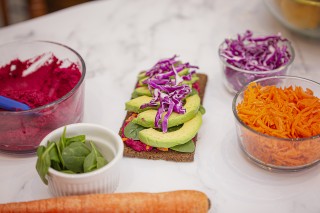Supermarket shelves are overflowing with gluten free breads, pastas, and desserts; while bookstore shelves are lined with diet books touting gluten free as the miracle cure for weight loss, but is it help or hype?
What is gluten?
Gluten is a protein found in wheat, other grains, and many processed foods. It is what holds bread together, and gives it a chewy texture.
Will I lose weight from a gluten free diet?
Gluten free diets were originally used to treat celiac disease, an autoimmune disorder that wreaks havoc on the intestinal tract. Celiac occurs in 1% of the population, and can only be definitively diagnosed by intestinal biopsy. If you haven’t been properly diagnosed, there is no benefit to going gluten free. If you do lose weight, it is likely because you have cut out so many foods, that at the end of the day, you are in a calorie deficit.
You may actually gain weight on this diet, thanks to the gluten free industry manufacturing a copious variety of gluten free junk foods. Just because a food is gluten free, does not make it calorie free. Worse yet, they are so highly refined, they lack important nutrients like fiber, minerals such as iron, calcium, and zinc, and many B vitamins.
To truly go gluten free, you would need to abandon most commercially prepared foods, since gluten is used as an additive in many brands of canned tuna, cottage cheese, soy sauce, spices, candies, cold cuts, canned beans, and frozen potato products, just to name a few. Gluten may be hidden in label ingredients such as malt, modified food starch, and maltodextrin. Consuming foods processed in the same plant as wheat can cause contamination, so if your oatmeal is not labeled as gluten free, it may contain gluten. Dining out can pose many challenges. So, you can see how tedious and confusing it can be to stick to this diet. Most people who think they are going gluten free for weight loss really are not because they cannot identify all of the gluten containing foods.
Instead of looking to gluten free products for weight loss, try displacing processed foods with fresh fruits and vegetables to reduce your calories. Get plenty of physical activity, including both cardiovascular exercise and strength training. You will feel better from eating whole, nutrient dense foods, and moving your body.
Is a gluten free diet medically necessary for me?
If you think you may have a gluten allergy, see your primary physician for a complete physical, then follow up with a credentialed specialist, such as a gastroenterologist and/or allergist. Be sure to include gluten in your diet while going through the testing phase. If you refrain from gluten during testing, you may get a false negative result. If you test positive for a wheat allergy, gluten sensitivity, or celiac disease, see a Registered Dietitian specializing in this area for dietary guidance.


 Follow Me On Instagram
Follow Me On Instagram Like My Facebook Page
Like My Facebook Page My LinkedIn
My LinkedIn



